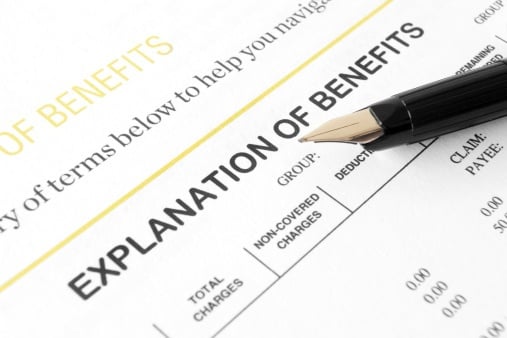By Natalia Courtois on Jun 28, 2017 @ 09:30 AM
The fear that sets in when you get an unexpected letter with prices for a doctor or dentist visit is very relatable. If you used your insurance at an appointment, you probably received something from your insurer called an Explanation of Benefits (EOB) that looks like a bill. So, is an EOB a bill? Fear not! Your eyes may be targeting a line that states “Patient’s Responsibility,” but rest assured that this is not a bill.
Instead, your insurance company sends you an EOB to explain how your benefits were applied to your office visit and to any procedures you might’ve had. Your EOB will typically list the date of service, the amount your provider billed your insurer and the amount paid out by your benefits.
If you owe an outstanding balance to the provider, like your copayment, for example, your provider will contact you directly. Therefore, an EOB is not a bill. Instead, think of an EOB as a receipt from your insurer for what your provider’s office submitted in its paperwork. This paperwork sent to your insurance is called a claim.
What is a claim?
A claim is a list of what the doctor is billing your insurance for. Claims can get pretty detailed. For example, if you see the dentist, the claim might include the actual exam, cleaning, X-rays, and more—even the medication used to numb an area in your mouth. Everything is billed and has its own procedure code to keep it regulated.
For example, a common first dental visit generally consists of three things. It can start off with an exam (D0120), a full mouth X-ray (D0210), and end with a routine cleaning (D1110). Please keep in mind that everyone’s mouth is different and therefore, everyone’s exam might be different.
Why did I get an EOB?
Your insurer sends you an EOB to keep you updated on the progress of your claim. It’s also a way for you to review the list of the procedures you had for accuracy. When the process is complete, your claim will be approved or denied.
Why would a procedure be denied?
A denial might occur if your insurer needs more documentation, like X-rays. If a procedure is denied, it can be reprocessed once the insurance company receives the additional information. Typically, your provider’s office will work directly with your insurer to resolve this.
What if I want more detail about my claims?
Once you’re finished with your first visit and have had your X-rays taken, either you’ll return in about six months for another cleaning, or your dentist might recommend some additional work. If so, you might want to ask your dental office to submit a pre-determination to your insurer. This will help you understand how your insurance benefits apply to the procedures recommended by your dentist.
Once your insurance company reviews the pre-determination, you will learn:
- What is being done
- How much you should be paying
- What has been approved
- Why something is denied
- What your insurance is covering
Being knowledgeable in claims can take a bit of research, but it doesn’t need to be an overwhelming procedure. Some insurance companies even give you the capability to view your claims online. That means a shorter wait to see results and the chance to be more financially prepared to take care of your oral health.





comments